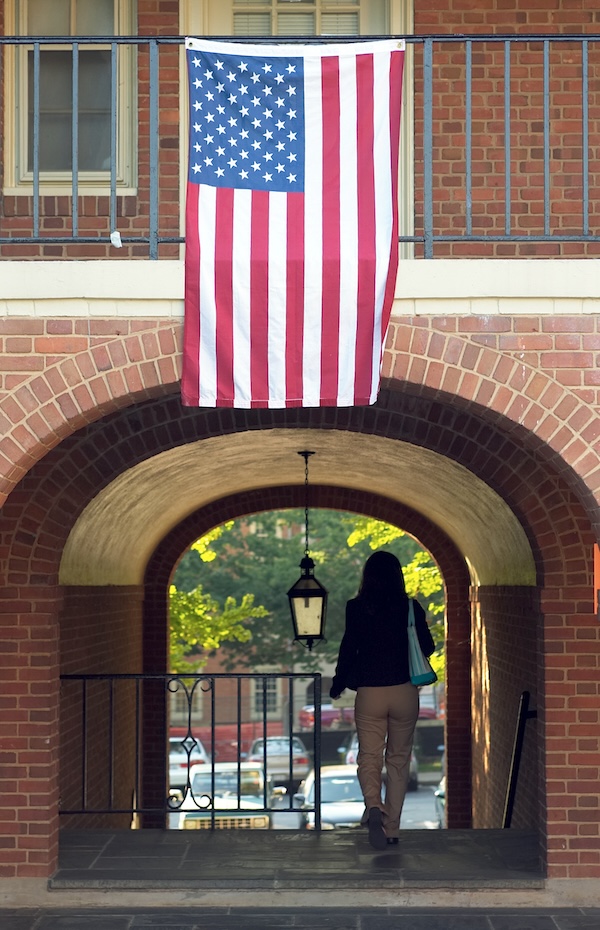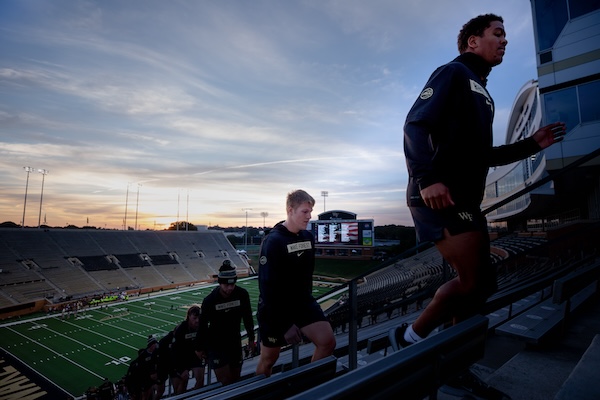
Editor’s note: Rachel Earp Knowles (’93) graduated fluent in the Russian language due to what she describes as “the close and inspired tutelage” of the late Professor of Russian Billy Hamilton. Knowles spent her junior year in Kyiv, Ukraine, at Kyiv State University. She was one of the first Americans to do so. That experience was made possible by a grant from the Pew Foundation that she credits Wake Forest for facilitating.
Knowles then earned a Master of Arts in Security Studies from Georgetown University and deployed multiple times as a civilian during her service to the Department of Defense. She was working at one of the Pentagon annex buildings on Sept. 11, 2001, and she has shared her reflection on that day and the work that immediately followed.
Twenty-four years later, we remember all Wake Forest alumni, family and friends affected by the terrorist attacks on that fateful day.

The sound of my shoes. Big clunky Nine West heels. “Let’s go,” I said. “We can’t stay in here.”
We had just watched two planes fly into the World Trade Center. At first glance on the news screens, they appeared to be biplanes. Amateurs that made a mistake. While we were watching that on the screens, there was a great explosion out the window. At that point, I said, “Let’s run.”
Twelve floors of jogging down in heels. The phones stopped working. The power went out. The elevators stopped working. Yelling. Smoke. We are OK. We are OK. It’s not us. We are going to make it.
Got to the car, sped home to Shirlington, Virginia, literally one mile from my office. By the time I got home, the phones worked. My brother was the first to reach me, and all I heard was his sigh of relief.
The smell. The smoke. The helicopters. At that point, I had been to war twice. I knew what war was. And this time it was in my home. My neighborhood.
Then I was called back into the building. My first task was receiving condolences from foreign governments. There were so many. Those were often paired with offers of “intel,” or intelligence, help. We took those governments up on those offers. We collected literal flowers from the embassies. I answered the phones for those that spoke Russian.

The most painful and impactful thing about that day for me was the fact that there was a group of schoolchildren and teachers from Washington, D.C., on one of the planes. They had earned a trip to California for an educational conference. There had been a story about it in the local morning news that day — that was the reason I knew.
Back then, there was no TSA (short for Transportation Security Administration) at airports. All were free to accompany their loved ones to the gate.
So the hijackers must have been sitting at the airport, watching these parents and teachers say goodbye, take pictures, give hugs to those kids when they planned to kill those children less than an hour later. That. Is. Evil.
That’s what has stuck with me for all these years — especially when my own children reached the age of those kids, around 10 or 11 years old.
After 9/11, what ensued was a multi-agency, international fact-finding mission and rectifying operation. I was so privileged in those early days to work with multiple operators, including deployed Marines on USS Peleliu.
The greatest honor of my life was to participate in the intel sharing that ensued. Intel exchange is a complicated process — determining who you can trust and with what. In those early days, the decisions were split-second: “We have to tell them — what are they giving us — let’s vet that.” It’s hard to know years hence if any of the intel we exchanged was valuable. As with all intel, success is silence and peace.

It was a memorable experience to be in the Pentagon in the days following 9/11. There were literally people waving flags in the street when we went back in. There were also soldiers with big guns that were probably AK-47s at the entrances. I had not seen that before. There were corridors in the Pentagon stuffed to the hilt with encouragement letters and pictures from schoolchildren all over the country. It was a blessing to have those.
I traveled widely for work in those early days. There was an immediate need to establish forward bases for military operational purposes in Uzbekistan, primarily. Of all the people on earth, I was the Department of Defense employee to have most recently been in Uzbekistan on duty. Great. We got out the maps to figure out where the base would be located.
Eventually, I moved on. The 9/11 experience was so painful for me that when my brother was diagnosed with stage 4 cancer at the same time he and his wife had a tiny baby, I was glad to move home to Texas to help them and make a new life for myself. I had been to war twice, followed by my involvement in 9/11, and I needed to heal.
Since then, I cringe on 9/11. Sometimes I cry. I was so glad to visit the 9/11 memorials in New York and at the Pentagon. In New York, there is a soundproof booth where you can speak and record your memories of that day. That’s wonderful. People need to do that.
I’ll end this with a tribute to Bob Hymel, a Defense Intelligence Agency colleague who died on 9/11 at the Pentagon. Bob was literally shot down in Vietnam and survived it, only to die as a civilian on a routine Tuesday morning, going to work like the rest of us.
God bless Bob and his family.
Rachel Earp Knowles (’93) served the United States as a civilian for two decades with the Department of Defense and the Department of Homeland Security. She lives in Denton, Texas, with her husband and two children.


